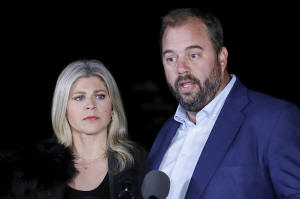Texas Supreme Court halts execution of man in shaken baby case after
lawmakers' last-minute appeal
 Send a link to a friend
Send a link to a friend
 [October 18, 2024]
By JUAN A. LOZANO and MICHAEL GRACZYK [October 18, 2024]
By JUAN A. LOZANO and MICHAEL GRACZYK
HUNTSVILLE, Texas (AP) ó The Texas Supreme Court halted Thursday nightís
scheduled execution of a man who would have become the first person in
the U.S. put to death for a murder conviction tied to a diagnosis of
shaken baby syndrome.
The late-night ruling to spare for now the life of Robert Roberson, who
was convicted of killing his 2-year-old daughter in 2002, capped a
flurry of last-ditch legal challenges and weeks of public pressure from
both Republican and Democratic lawmakers who say he is innocent and was
sent to death row based on flawed science.
In the hours leading up to the ruling, Roberson had been confined to a
prison holding cell a few feet from America's busiest death chamber at
the Walls Unit in Hunstville, waiting for certainty over whether he
would be taken to die by lethal injection.
ďHe was shocked, to say the least,Ē said Texas Department of Criminal
Justice spokesperson Amanda Hernandez, who spoke with Roberson after the
court stayed his execution. ďHe praised God and he thanked his
supporters. And thatís pretty much what he had to say."
She said Roberson would be returned to the Polunsky Unit, about 45 miles
(72 kilometers) to the east, where the stateís male death row is
located.
Roberson, 57, was convicted of killing of his daughter, Nikki Curtis, in
the East Texas city of Palestine. His lawyers and some medical experts
say his daughter died not from abuse but from complications related to
pneumonia.

Order capped a night of last-minute maneuvers
It is rare for the Texas Supreme Court ó the state's highest civil court
ó to get involved in a criminal matter.
But how the all-Republican court wound up stopping Roberson's execution
in the final hours underlined the extraordinary maneuvers used by a
bipartisan coalition of state House lawmakers who have come to his
defense.
Rejected by courts and Texas' parole board in their efforts to spare
Roberson's life, legislators on Wednesday tried a different route:
issuing a subpoena for Roberson to testify before a House committee next
week, which would be days after he was scheduled to die. The unusual
plan to buy time, some of them conceded, had never been tried before.
They argued that executing Roberson before he could offer subpoenaed
testimony would violate the Legislature's constitutional authority. Less
than two hours before Roberson's execution, a judge in Austin sided with
lawmakers and paused the execution, but that was then reversed by an
appeals panel. The Texas Supreme Court then weighed in with its order,
ending a night of uncertainty.
Roberson is scheduled to testify before the committee Monday.
"This is an innocent man. And thereís too much shadow of a doubt in this
case," said Democratic state Rep. John Bucy. ďI agree this is a unique
decision today. We know this is not a done deal. He has a unique
experience to tell and we need to hear that testimony in committee on
Monday.Ē
Governor and US Supreme Court did not move to halt execution
Gov. Greg Abbott had authority to delay Robersonís punishment for 30
days. Abbott has halted only one imminent execution in nearly a decade
as governor and has not spoken publicly about the case.
Earlier Thursday, the U.S. Supreme Court refused to halt the execution,
although Justice Sonia Sotomayor ó in a 10-page statement about the case
ó urged Abbott to grant a 30-day delay.

[to top of second column]
|

Texas state representatives Lacey Hull, left, and John Bucy III
comment during a press conference after the stay granted by the
Texas Supreme Court to halt the execution of Robert Roberson, at the
Huntsville Unit of the Texas State Penitentiary, Thursday, Oct. 17,
2024, in Huntsville, Texas. (AP Photo/Michael Wyke)

Robersonís lawyers had waited to see if Abbott would grant Roberson
the one-time reprieve. It would have been the only action Abbott
could take in the case as the Texas Board of Pardons and Paroles on
Wednesday denied Robersonís clemency petition.
The board voted unanimously, 6-0, to not recommend that Robersonís
death sentence be commuted to life in prison or that his execution
be delayed. All board members are appointed by the governor. The
parole board has recommended clemency in a death row case only six
times since the state resumed executions in 1982.
The one time Abbott halted an imminent execution was when he spared
the life of Thomas Whitaker in 2018.
Lawmakers invoke Texas' law on scientific evidence
The House committee on Wednesday held an all-day meeting on
Roberson's case. In a surprise move at the end of the hearing, the
committee issued the subpoena for Roberson to testify next week.
During its meeting in Austin, the committee heard testimony about
Robersonís case and whether a 2013 law created to allow people in
prison to challenge their convictions based on new scientific
evidence was ignored in Robersonís case.
Anderson County District Attorney Allyson Mitchell, whose office
prosecuted Roberson, told the committee a court hearing was held in
2022 in which Robersonís attorneys presented their new evidence to a
judge, who rejected their claims.
ďBased on the totality of the evidence, a murder took place here.
Mr. Roberson took the life of his almost 3-year-old daughter,Ē
Mitchell said.
Most of the members of the House committee are part of a bipartisan
group of more than 80 state lawmakers, including at least 30
Republicans, who had asked the parole board and Abbott to stop the
execution.
Case puts spotlight on shaken baby syndrome
Robersonís case has renewed debate over shaken baby syndrome, known
in the medical community as abusive head trauma.

His lawyers as well as the Texas lawmakers, medical experts and
others including bestselling author John Grisham say his conviction
was based on faulty and now outdated scientific evidence. The
diagnosis refers to a serious brain injury caused when a childís
head is hurt through shaking or some other violent impact, like
being slammed against a wall or thrown on the floor.
Robersonís supporters donít deny head and other injuries from child
abuse are real. But they say doctors misdiagnosed Curtisí injuries
as being related to shaken baby syndrome and that new evidence has
shown the girl died from complications related to severe pneumonia.
Robersonís attorneys say his daughter had fallen out of bed in
Robersonís home after being seriously ill for a week.
Robersonís lawyers also suggested his autism, then undiagnosed at
the time of his daughterís death, was used against him as
authorities became suspicious of him because of his lack of emotion
over her death. Autism affects how people communicate and interact
with others.
All contents © copyright 2024 Associated Press. All rights reserved |